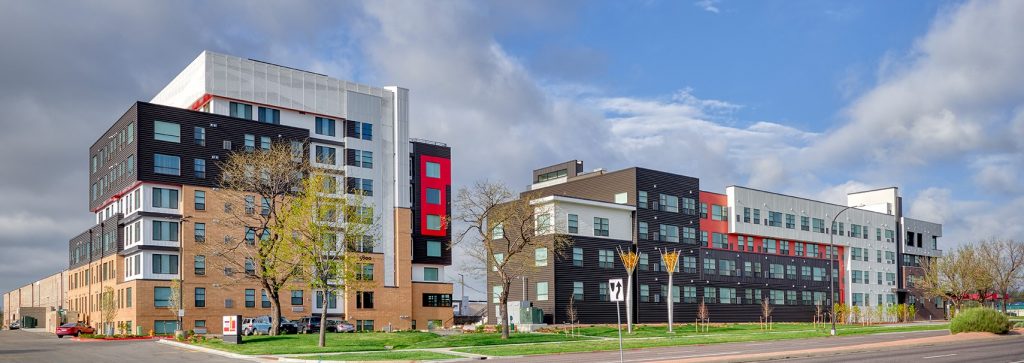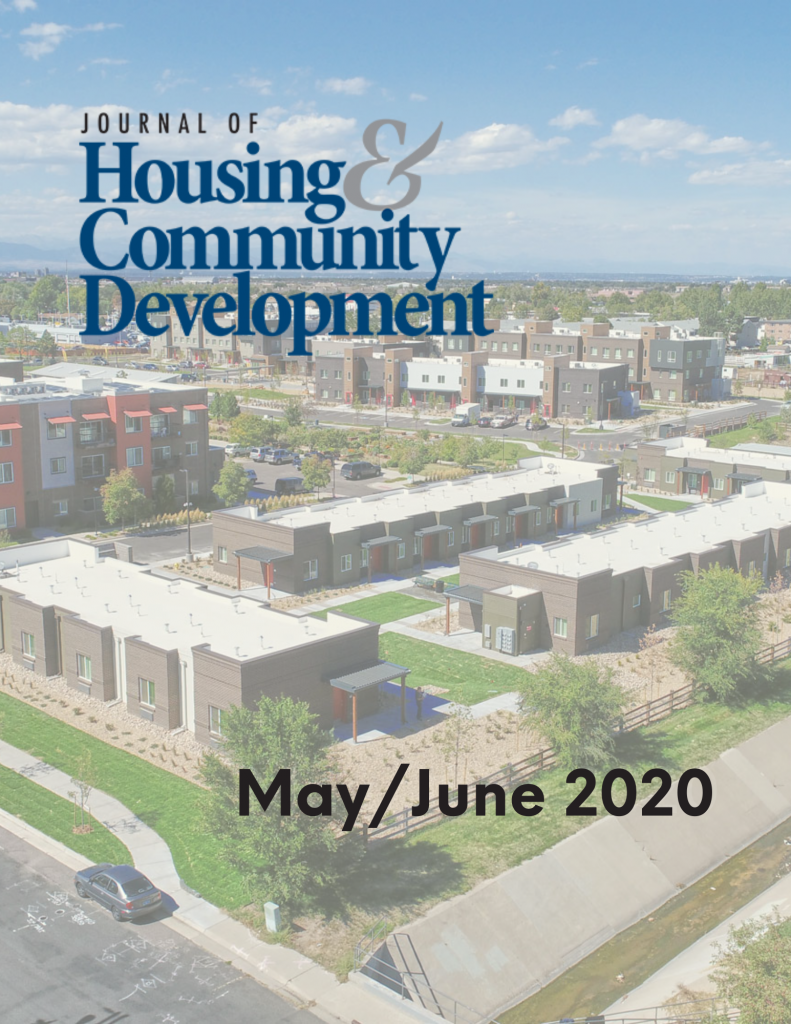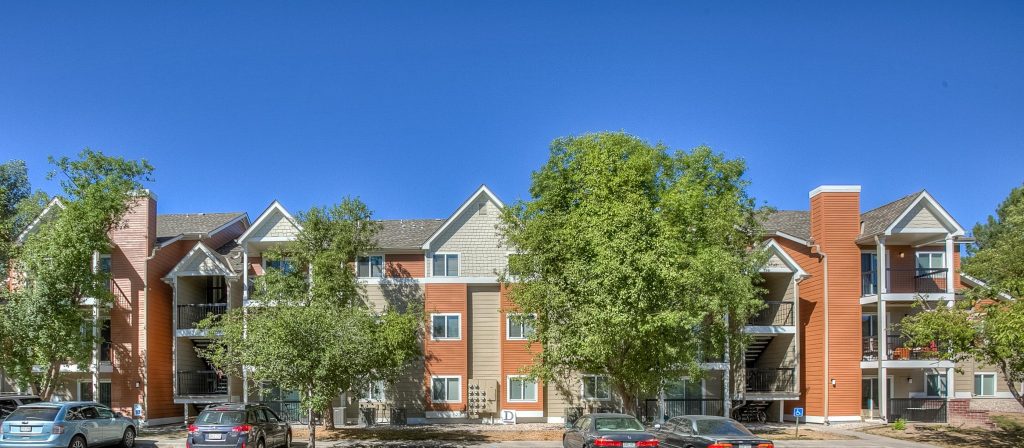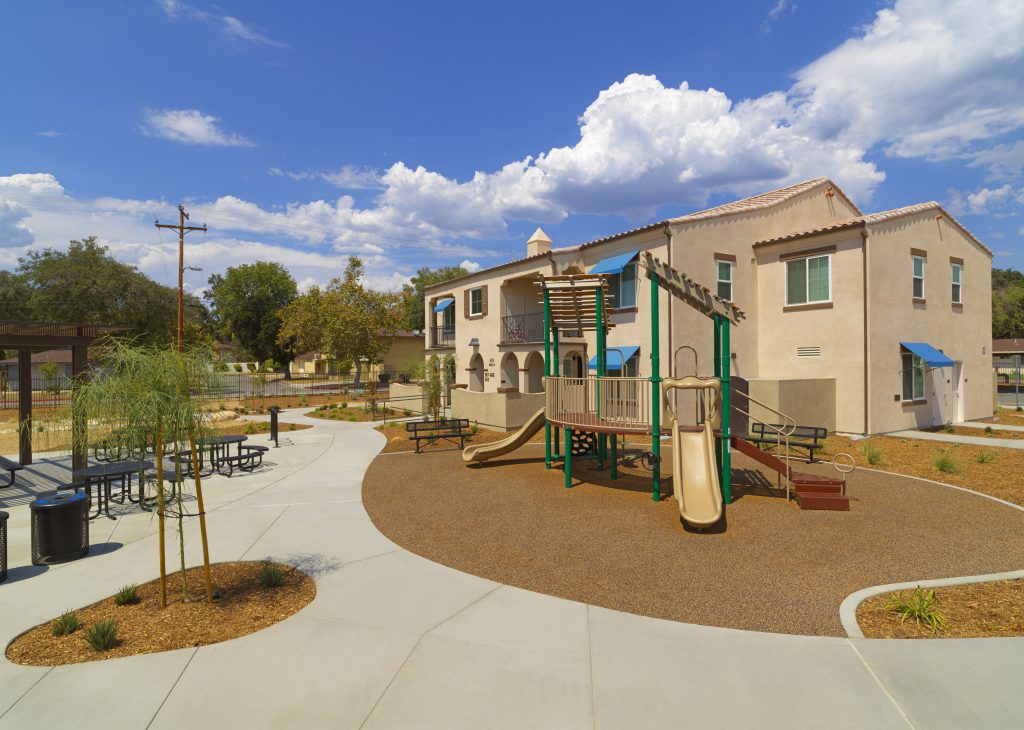Leadership in Lakewood: From Offices to Affordable Housing

Metro West Housing Solutions wins a 2019 Award of Excellence in Community Revitalization for transforming a vacant office building into a high-quality affordable housing development. Nominated from among the NAHRO Award of Merit winners each year, the Awards of Excellence winners are chosen by national juries and honored at the annual National Conference and Exhibition in October. They represent the very best in innovative programs in assisted housing and community development.
Metro West Housing Solutions (MWHS) has been an affordable housing provider in the Lakewood, Colorado community since 1974. Lakewood is in dire need of more affordable housing. The average rent in the area has risen by at least 23.4 percent since 2014. Recently, MWHS transformed a vacant office building at 5800 W. Alameda Avenue into an affordable housing development. Although Fifty-Eight Hundred is near the popular Belmar downtown shopping and dining center, it had been unable to attract any retail or office tenants for decades. MWHS saw an opportunity to kickstart the redevelopment of the Alameda Corridor by creating housing in what some called “the ugliest building in Lakewood.” Fifty-Eight Hundred is now a 152-unit apartment building. Unit sizes range from studios to three-bedroom family apartments. Households earning between 30 percent – 60 percent of the area median income are eligible for a unit.
MWHS benefitted from forming strategic partnerships to support the Fifty-Eight Hundred development. For example, they partnered with Alameda Connects—a local nonprofit—and the Alameda Corridor Business Improvement District (BID) to participate in a larger effort to revitalize the community. The Alameda Corridor BID provided a public art sculpture and beautiful landscape in the public space near Fifty-Eight Hundred. MWHS also coordinated investors, architects, interior designers, contractors, funders, and community stakeholders to contribute expertise to the project.
The development process for Fifty-Eight Hundred did not come without challenges. The construction and design teams used innovative solutions to navigate the obstacles that came with turning an office structure into apartment units. Structural columns and rebar tendons were integral parts of the building that could not be moved. Built in 1981, the structure was not in compliance with ADA regulations prior to construction. The construction budget was also unclear in the beginning, since the team could not anticipate every setback they might encounter while transforming the building. However, the hard work of the entire team resulted in high-quality apartment units at the end of the 14-month construction period. In addition to its apartments, Fifty-Eight Hundred includes an energy efficient design, solar panel system, and various murals and public artworks.
Residents of Fifty-Eight Hundred have access to high-quality amenities and resident services. On-site features include youth and adult education rooms, a community room, bike storage, a fitness center, and a rooftop deck with mountain views. The Resident Services Coordinator at the property helps connect residents with the resources and opportunities available to them in the Lakewood community. A nearby bus stop also provides easy access to transportation.
As anticipated, Fifty-Eight Hundred has had a positive impact on the Alameda Corridor and the Lakewood economy. Construction occurred in conjunction with the opening of the New America Lakewood charter school, which occupies a previous retail strip center connected to Fifty-Eight Hundred. Several new employment opportunities resulted from these developments, including:
- 150 full-time equivalent design and construction positions (during construction)
- 6 full-time positions for Fifty-Eight Hundred
- 21 full-time positions at New American Lakewood charter school
Traffic from apartment residents and school attendees has already increased ridership on the Regional Transportation District (RTD) bus stop. The additional people in the area will also contribute to increased business for a neighborhood in Lakewood that has generally not seen significant revenue. MWHS anticipates that the success of Fifty-Eight Hundred will encourage further development in the Alameda Corridor. The creative design and high quality of Fifty-Eight Hundred also raises the bar for affordable housing in Lakewood. For some, the development has changed their outlook on what affordable housing means for a community.
In total, Fifty-Eight Hundred was a $40 million development. MWHS obtained a mix of public and private funding to complete the project. The largest source came from $20,728,441 in competitive Low-Income Housing Tax Credits. Additional funds included $600,000 in HOME grants, $200,000 from a U.S. EPA brownfield cleanup grant, and $800,000 in State Housing Development grants. MWHS also received the first grant from the Denver Regional Transit-Oriented Development Fund that did not go toward a light rail or Denver County site. The unique blend of funding sources for Fifty-Eight Hundred allowed MWHS to selectively rehabilitate the office building according to high standards, while maintaining affordability for its residents.
MWHS displayed excellence in its ability to bring a complicated project to completion. Lakewood residents now have more access to affordable housing and an improved community environment because of the Fifty-Eight Hundred apartments. Beyond the physical transformation, the development is also fostering a greater sense of community in Lakewood’s Alameda Corridor. Tami Fischer, the Executive Director and CEO for MWHS, believes that “Fifty Eight hundred injected the neighborhood with vibrant and eye-catching design, a sense of community, and 310 residents to support the local economy as they found safe and affordable housing and a place to call home.”
More Articles in this Issue
Rehabilitating Properties to Build a Community
Housing Catalyst wins a 2019 Award of Excellence in Community Revitalization for creating a new…Protecting a Community Together
The Houston Housing Authority wins a 2019 Award of Excellence in Community Development for collaborating…How Newark, N.J.’s Teachers Village Is Building a Community Around Education, Affordability, and Small Business Development
This article was originally published on brookings.edu A lot has been written about our nation’s…Community Revitalization, One Step at a Time
National CORE wins a 2019 Award of Excellence in Community Revitalization for redeveloping the Arrowhead…





